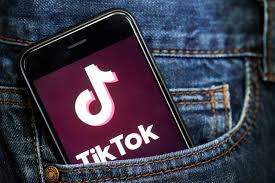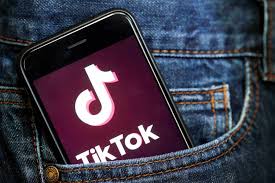
In the biggest threat to the app since the Trump administration, the U.S. House of Representatives easily passed a bill this week that would give ByteDance, the Chinese company that owns TikTok, roughly six months to sell off the U.S. assets of the short video app or risk being banned.
What is known about the Chinese business, which was estimated to be worth $268 billion in December, is listed below.
ByteDance, dubbed "App Factory" because of its regular mobile application releases, was established in Beijing in 2012 by Zhang Yiming, a software engineer.
Because of the powerful recommendation engines that power its popular apps, such TikTok, Douyin, and Toutiao, the company is frequently regarded as the world leader in algorithms.
Toutiao, a news aggregation app that was launched in 2012 and uses machine learning algorithms to give each user a personalised content stream, was its first big hit.
In less than a year after its release, Douyin, the Chinese counterpart of TikTok, which debuted in late 2016, became ByteDance's second app with over 100 million users.
Next year, ByteDance released TikTok, an international Douyin version. The two apps have the same logo and a similar user interface design, despite ByteDance's claim that they were positioned as two distinct products from the start.
Zhang, who was raised in the coastal province of Fujian in the southeast, attended Nankai University in Tianjin to study software engineering. He held several tech positions before to starting ByteDance, including a short spell at Microsoft.
When ByteDance first started out, he worked mostly on Toutiao and Douyin in Beijing. However, since the COVID-19 pandemic, he has been working more frequently abroad, with Singapore serving as a major base, according to sources with knowledge of the situation. They were not allowed to speak with the media, therefore they declined to be identified.
Zhang relinquished his position as CEO of ByteDance in 2021, handing over control to his co-founder and flatmate during university, Liang Rubo. He claimed at the time that he didn't have the social skills to be a great manager and that he would much prefer focus about the company's long-term plan out of the spotlight.
Approximately 60% of ByteDance is "beneficially owned by global institutional investors such as Carlyle Group, General Atlantic, and Susquehanna International Group," with the other 20% being owned by Zhang and the staff, according to a release released by TikTok in May of last year.
According to sources, Zhang nevertheless has more than 50% of ByteDance's vote rights.
According to state media, China's ruling Communist Party established a party branch at ByteDance in 2014, as is the case with other large Chinese corporations. This development raised questions about Beijing's potential influence over the company.
After the Chinese government acquired a 1% share in Beijing ByteDance Technologies, the company's local affiliate, in 2019 and was granted a board seat, the scrutiny around ByteDance became even more.
During the Trump administration, ByteDance became a major target of the American government. In 2020, the government issued executive orders requiring ByteDance to sell TikTok's U.S. assets or risk being prohibited from entering the nation. Federal courts blocked the orders.
At the time, Beijing, which disapproved of Trump's executive order, updated a list of technologies that required Chinese government clearance before to sale. TikTok's recommendation algorithm, according to experts, would be included in this list.
U.S. officials have slammed TikTok for its security and privacy, raising concerns that Beijing might receive user data.
About 170 million Americans use TikTok, and the company claims that it has never given or received a request to give Chinese authorities access to user data from American users.
In an effort to allay worries, TikTok partnered with Oracle and began storing user data from Americans on the cloud infrastructure of the American company in 2020.
TikTok has been opposing the most recent bill proposal. This week, the company's CEO, Shou Zi Chew, declared that in order to avoid a ban, the company would take legal action.
(Source:www.reuters.com)
What is known about the Chinese business, which was estimated to be worth $268 billion in December, is listed below.
ByteDance, dubbed "App Factory" because of its regular mobile application releases, was established in Beijing in 2012 by Zhang Yiming, a software engineer.
Because of the powerful recommendation engines that power its popular apps, such TikTok, Douyin, and Toutiao, the company is frequently regarded as the world leader in algorithms.
Toutiao, a news aggregation app that was launched in 2012 and uses machine learning algorithms to give each user a personalised content stream, was its first big hit.
In less than a year after its release, Douyin, the Chinese counterpart of TikTok, which debuted in late 2016, became ByteDance's second app with over 100 million users.
Next year, ByteDance released TikTok, an international Douyin version. The two apps have the same logo and a similar user interface design, despite ByteDance's claim that they were positioned as two distinct products from the start.
Zhang, who was raised in the coastal province of Fujian in the southeast, attended Nankai University in Tianjin to study software engineering. He held several tech positions before to starting ByteDance, including a short spell at Microsoft.
When ByteDance first started out, he worked mostly on Toutiao and Douyin in Beijing. However, since the COVID-19 pandemic, he has been working more frequently abroad, with Singapore serving as a major base, according to sources with knowledge of the situation. They were not allowed to speak with the media, therefore they declined to be identified.
Zhang relinquished his position as CEO of ByteDance in 2021, handing over control to his co-founder and flatmate during university, Liang Rubo. He claimed at the time that he didn't have the social skills to be a great manager and that he would much prefer focus about the company's long-term plan out of the spotlight.
Approximately 60% of ByteDance is "beneficially owned by global institutional investors such as Carlyle Group, General Atlantic, and Susquehanna International Group," with the other 20% being owned by Zhang and the staff, according to a release released by TikTok in May of last year.
According to sources, Zhang nevertheless has more than 50% of ByteDance's vote rights.
According to state media, China's ruling Communist Party established a party branch at ByteDance in 2014, as is the case with other large Chinese corporations. This development raised questions about Beijing's potential influence over the company.
After the Chinese government acquired a 1% share in Beijing ByteDance Technologies, the company's local affiliate, in 2019 and was granted a board seat, the scrutiny around ByteDance became even more.
During the Trump administration, ByteDance became a major target of the American government. In 2020, the government issued executive orders requiring ByteDance to sell TikTok's U.S. assets or risk being prohibited from entering the nation. Federal courts blocked the orders.
At the time, Beijing, which disapproved of Trump's executive order, updated a list of technologies that required Chinese government clearance before to sale. TikTok's recommendation algorithm, according to experts, would be included in this list.
U.S. officials have slammed TikTok for its security and privacy, raising concerns that Beijing might receive user data.
About 170 million Americans use TikTok, and the company claims that it has never given or received a request to give Chinese authorities access to user data from American users.
In an effort to allay worries, TikTok partnered with Oracle and began storing user data from Americans on the cloud infrastructure of the American company in 2020.
TikTok has been opposing the most recent bill proposal. This week, the company's CEO, Shou Zi Chew, declared that in order to avoid a ban, the company would take legal action.
(Source:www.reuters.com)














